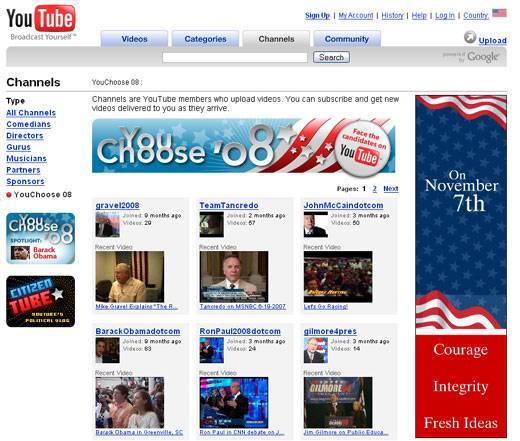It’s no secret that Google has influence. Being the most heavily used search engine, they in a very real sense control the distribution of information to much of the world. But Google has increasingly been peddling its influence in American politics (which, as the rest of the world is well aware, can have far reaching global consequences). And Google isn’t just influencing elections with their pocket book (though they did give $288,000 to candidates in the last US election cycle in 2006), they are becoming an increasingly more important player in the 2008 American election for president.

Yesterday, Google officially unveiled its newest blog: Google Public Policy. The blog, which carries the tagline “Google’s views on government, policy and politics,” is different than any other Google blog in that it has nothing to with their technology. The blog will instead be an outlet for Google’s views “on issues like net neutrality, censorship, innovation regulation, immigration, R&D, national security, and trade” (“just to name a few”). Google’s public policy team, who author the blog, say that they hope to foster a “dialogue” with Google users about political issues in order to “do a better job of fighting for our common interests.” But a new blog is just a small piece of Google’s strategy for influencing government policy.
Google is fast becoming a proving ground for top-tier US presidential candidates ahead of the upcoming 2008 election cycle. “Does Google want to be the 51st state this election season?” was a question recently posed in the San Jose Mercury News.
“The company’s embrace of the 2008 campaign ranges from urging candidates to post videos on YouTube and buying ads on Google to stopping in to be grilled by employees at the Googleplex and giving exclusive YouTube interviews. And next month, Google/YouTube will take another step into presidential politics, co-sponsoring a presidential debate.
As Google positions itself as a virtual election headquarters for 2008, the question becomes whether one of America’s most successful companies can balance its professed civic aims with corporate profits.”
Google’s most noticeable splash in this year’s elections is their You Choose channel on YouTube, which displays videos from American presidential candidates, and their political video blog CitizenTube. YouTube will also be co-hosting a pair of debates in July and August in partnership with cable news network CNN.

It would be easy to write off YouTube’s influence on the American political spectrum (it’s just a place for music videos, unauthorized South Park clips, and cats doing stupid things, right?), but the site has allowed candidates to reach a massive audience with a relatively minuscule investment, which has potentially changed the rules. Relative underdog Ron Paul has racked up far more YouTube channel views than any of his fellow Republican candidates. It is hard to imagine a more cost-effective way for a candidate who has been out-fundraised by tens of millions of dollars to get the word out to voters than by making waves on YouTube.
A number of videos have already had an effect on the 2008 primary elections, and some candidates have used YouTube to float unflattering clips of their opponents. Sen. John McCain recently used the site to post a video of competitor, Gov. Mitt Romney, that appeared to show Romney contradicting statements he had made in a magazine interview, for example. YouTube has allowed unfortunate political gaffes to become major black marks on a candidate’s record over night. The potential for everything and anything you say or do to be taped and leaked out over the Internet is an unfamiliar dynamic in politics.
Google has also been inviting presidential candidates to the Google campus for interviews in front of Google employees. Yesterday they hosted unannounced candidate and New York City Mayor Michael Bloomberg. So far they have already played host to visits from former Sen. John Edwards, Gov. Bill Richardson and Sens. Hillary Clinton and John McCain — all running for president of the US in 2008. These interviews have garnered so much press, that Google is quickly becoming a required campaign stop — the Iowa or New Hampshire of the digital world, perhaps.
YouTube introduces the CNN/YouTube debates.
This is not Google’s first foray into politics, of course. Shortly before the 2006 mid-term elections in America, the San Francisco Chronicle reported that Google had filed paperwork to form a political action committee called NetPAC “to support candidates who promote an open and free Internet for our users.” They also hired to former Republican senators Dan Coats of Indiana and Connie Mack of Florida to work as lobbyists.
And let’s not forget Google bombs. In 2003, a group of web activists made a concerted effort to cause searches for the phrase “miserable failure” to be linked with the website for US president George W. Bush. In 2004, the Democratic candidate for president, Sen. John Kerry, found his name linked with the search term “waffles.” While its doubtful the these Internet pranks had much effect the polls, the story about these political Google bombs exploded across the mainstream press (no pun intended), perhaps proving just how influential Google could be in American politics.
Conclusion
Lobbying and PACs are the more traditional road for corporations to influence American politics. Google’s latest approach leverages social technologies (the backbone of web 2.0?) to bypass Washington completely. By creating platforms for candidates and talking directly to the people, Google has positioned themselves as a major force in shaping American political policy (and by extension, have a far reaching global effect). At the same time, Google’s political forays will likely strengthen their brand — not just by helping them get what they want politically, but also by associating their name with yet another staple of American life: the democratic process. (And Google isn’t just talking about American politics… their blog has a post on the recent French presidential elections, for example.)
What do you think of Google’s influence on politics? Is this a good thing? What is the answer to the question posed by the San Jose Mercury News: can Google “balance its professed civic aims with corporate profits?” Leave your thoughts in the comments below.









